Rags to pads: Young tribal women of Rewa, Madhya Pradesh successfully script the switchover
Over 26 villages in Rewa district of Madhya Pradesh are benefitting from a menstrual hygiene campaign of Dastak Kishori Samuh, a group of young tribal women, who are stitching sanitary pads and distributing to rural women.


In a brightly lit compact room with pink walls, about 500-kilometre from the state capital of Madhya Pradesh, a group of young college girls from the local tribal community in Rewa, sit on the floor mats, surrounded by cotton wool, thin blue coloured polythene sheets, rayon tissue, glue and a sewing machine.
Mamta Adivasi, Asma Adivasi and Uma Adivasi are a part of the Dastak Kishori Samuh, an eight-member women’s group based in Rewa district of Madhya Pradesh, which, for the last two years, is helping address the issue of menstrual hygiene by stitching sanitary pads and distributing them to women in 26 villages.
Due to the concerted efforts by these young women, days when periods and pads were taboo topics spoken in hushed tones are slowly ending in many villages in Rewa. These college students are changing the mindset of villagers as sanitary pads slowly edge out the period rag, especially among young women in the villages.
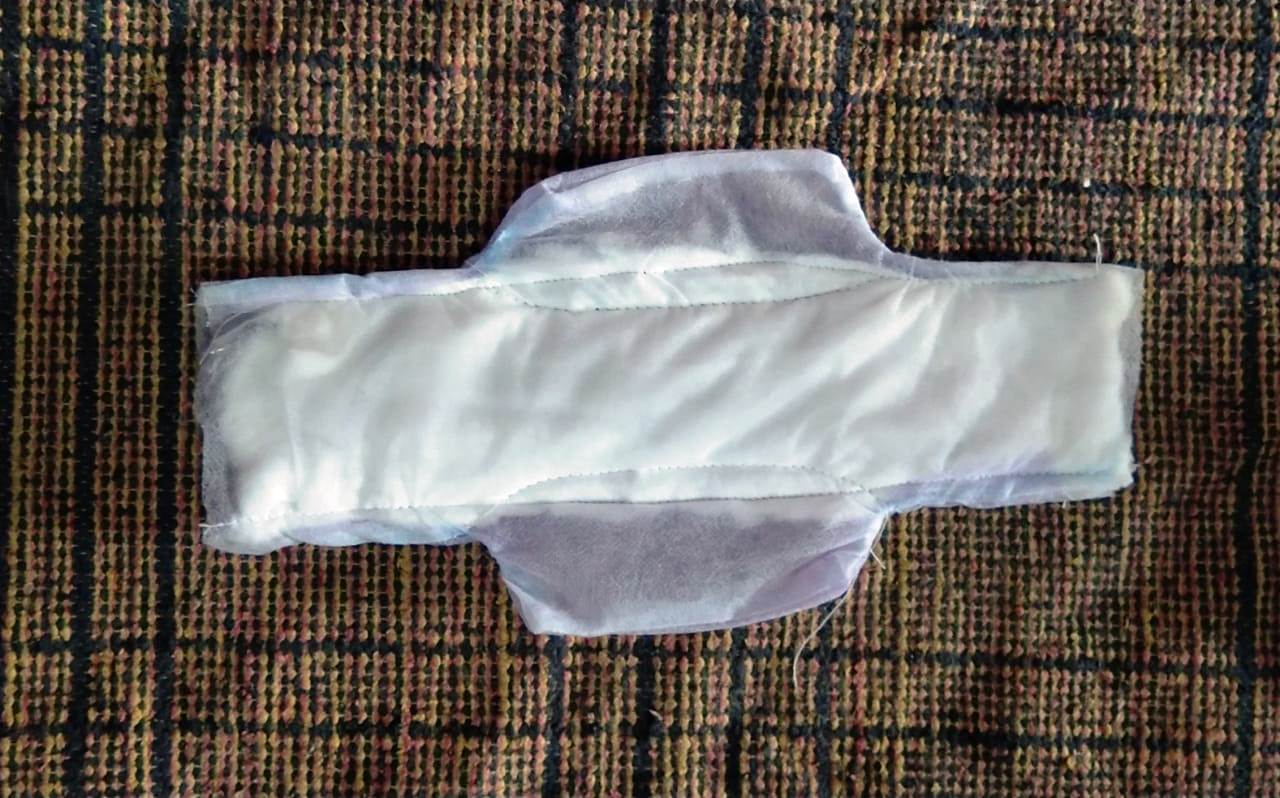
Working as volunteers, the members of Dastak Kishori Samuh regularly hold discussions with the village women on monthly periods and are trained to make sanitary pads. These pads are packed in sets of eight and distributed to women in 26 surrounding villages, often free of cost or at very low prices.
“All the members of our group received a free training to make sanitary napkins. I learnt to make pads within 15 days. Till now I have made about 250 such napkins. It takes me 20 minutes to make one pad,” Asma told Gaon Connection. She is a B.Com final year student from Dabhaura village in Rewa. “The biggest advantage is that when we need pads, we can make them ourselves. And, unlike the popular brands available in the market, our sanitary pads are cheap and affordable,” she added.
The first step in making a sanitary pad is careful selection and cutting of thin blue polythene sheet, rayon tissue and cotton wool according to the set size. These are then layered followed by stitching the sides of the pad on a sewing machine and applying glue for fixation. Thereafter, the pads are kept in a box-like machine for sanitisation and then wrapped in a white packet to distribute to the local villagers, such as Loni 521, Ansara, Turka, Dhurkuchh and Lafanda.
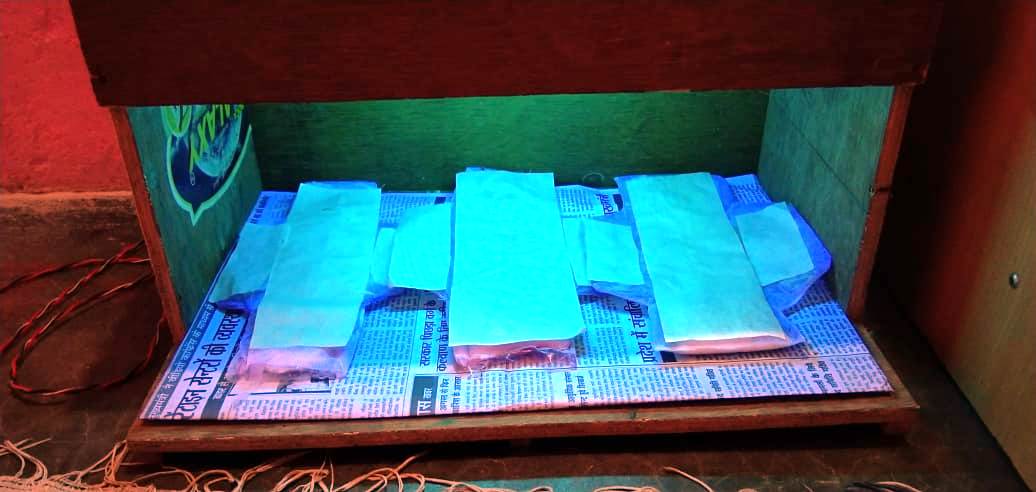
Together, these young women are transforming the prevalent social and cultural mindset related to menstruation as well as challenging taboos surrounding ‘monthly bleeding’ in villages of Rewa.
“I like working on social issues and joined Dastak Kishori Samuh last November. My family supports me in this work,” Renu Sahu, another young member of the group told Gaon Connection.
The eight members of Dastak Kishori Samuh belong to different villages of Rewa district and meet in the office of Rewanchal Dalit Adivasi Seva Sansthan Samiti, a grassroots organisation based in Dabhaura. This non-profit runs the pad making activity two-three times a week for four hours each when these young women stitch pads at its office room with pink walls.
“During the lockdown, many families in the villages did not have money and benefitted from the free pads distributed by these young women. We also gave free sanitary napkins to female labourers on the Rewa-Sohagi Highway Bypass,” Ram Naresh, a social activist associated with Rewanchal Samiti told Gaon Connection.
“Before the lockdown was enforced, these girls distributed pads at Rs 15 to Rs 20 per packet [eight pads in each packet]. It helped us buy some materials for the pads, as each packet costs over Rs 25,” he added.
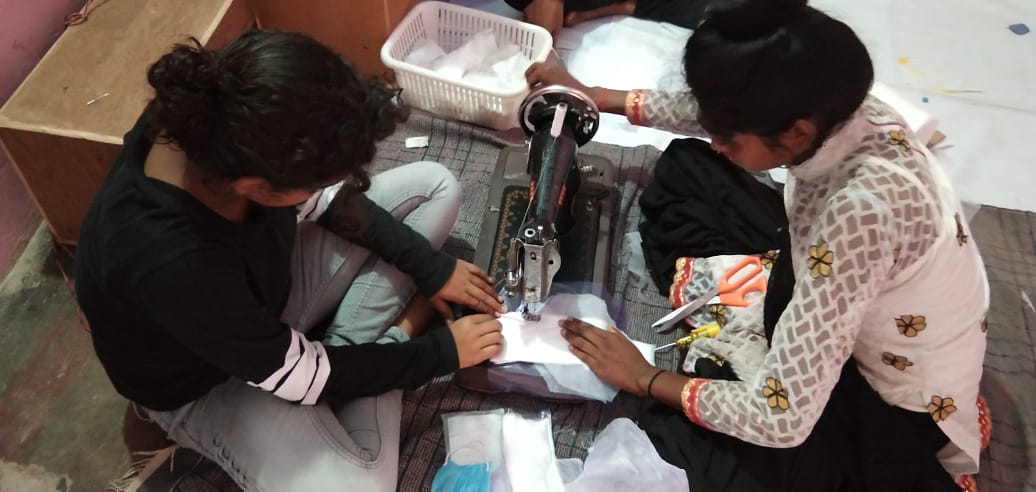
Challenging social norms
Remembering her school days, Asma said her mother first told her about periods when her white school uniform spotted and she had to rush home to change. “Till then I had not even heard about periods,” she said.
“Today girls in my village know about menstruation and are not caught unawares. Many do not hesitate to ask relevant questions regarding menstrual cycle and mandatory hygiene measures,” she told Gaon Connection.
There has been a sea change since 2018, when these young women were first trained to make pads by the members of Rewanchal Dalit Adivasi Seva Sansthan Samiti.
One of the positive outcomes is that many girls in neighbouring villages have switched over to pads from period cloth. Latter was often an unhygienic rag, almost never sun-dried due to shame.
“When we used to visit the villages for discussions about menstrual hygiene, many girls complained about vaginal infection. During monsoon, cloth pieces did not dry properly,” Varsha Sahu, another group member, and a B.Sc student told Gaon Connection. “Pads scored over cloth pieces by providing a safe and hygienic experience,” she added.
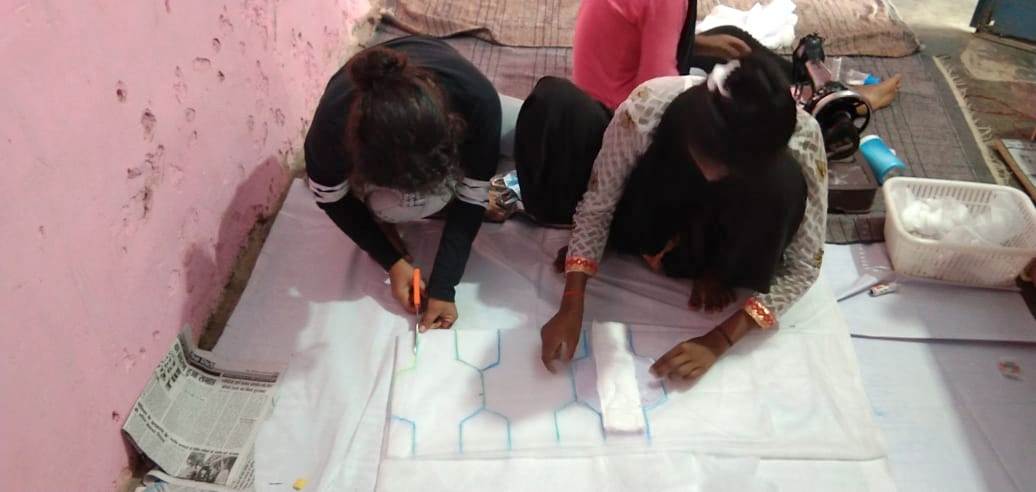
Positive discourse on health and sanitation
According to Sanjay Kumar Kaul, associated with the pad-making initiative of the Rewanchal Samiti, when members of his organisation used to visit villages to discuss health issues, many women opened up about problems they faced during periods, like scarcity of money to buy sanitary pads and distance from the market. That is when the non-profit decided to start making cheaper pads for rural women.
“We cleaned up a room in the Rewanchal Samiti’s office and started making pads. Teenage girls who showed interest were trained to make pads and they also helped us distribute pads in the villages,” said Kaul.
These young women were trained in making sanitary napkins as part of skill development initiative by Madhya Pradesh-based non-profit, Vikas Samvad Samiti, which provided the monetary assistance as and when needed.
“These young women learn to make pads as part of their education in menstrual hygiene. Making pads also enables them to hold healthy discussions regarding periods,” said Sia Dulari, head of the Rewanachal Samiti.
“We first distributed pads free of cost and garnered positive response from the local women. Then many girls came forward to learn pad-making and were trained,” she told Gaon Connection.
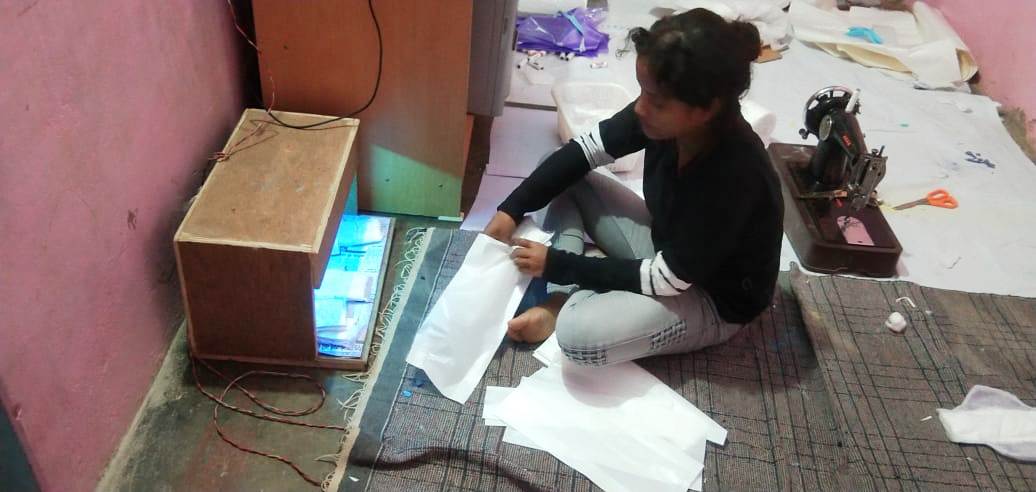
Support from Delhi
Apart from the local organisations, such as Vikas Samvad Samiti and Rewanchal Dalit Adivasi Seva Sansthan Samiti, another non-profit assisted the young tribal women in Rewa to take the lead in pad-making and spearhead a campaign on menstrual hygiene.
Delhi-based Environics Trust trained the women group members and also donated two months pad-making materials to them.
“We worked with Rewanchal Samiti in Rewa, and Prithvi Trust in Khajuraho to train young women in pad making, and also gave them sufficient materials for two months so that they could start a livelihood activity,” S Vanitha of Environics Trust told Gaon Connection. “The size of our napkins is customised. We make it as big as a cloth napkin. We also use high-quality cotton, which is skin friendly,” she added.
“Many women need longer pads due to heavy bleeding, so the sanitary napkins made by our group are three inches in width and nine inches in length,” said Asma. The nine inches length size suits all even though we also make smaller pads, she added.
Slowly but steadily rural women in Rewa have come to accept sanitary pads. Mamta Devi Kol, a resident of Garve village in Rewa, and a member of Dastak Kishori Samuh, travels 15-kilometre to reach Rewanchal Samiti’s office to make pads and distribute them. The last pad distribution was carried out on July 25 maintaining the norms of physical distancing.
“The economic condition of rural households is not good enough to buy sanitary pads every month. But, cloth pieces emit foul smell, and pads are clean and make us feel comfortable.,” said Senu Sahu from Ansara village in Rewa.
Also Read: Sanitary pads were not easily available, so these girls and boys started making cloth pads at home.
Also Read: Adolescents in Rajasthan villages discuss periods and reproductive health, shattering taboos.
Also Read: Promoting the use of menstrual cups will be a huge step towards protecting the environment.

